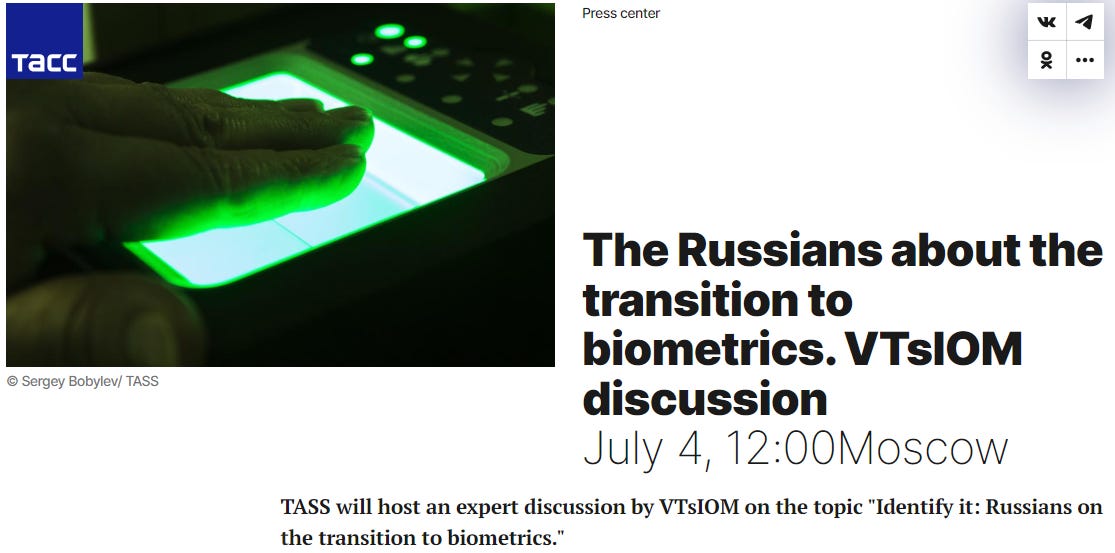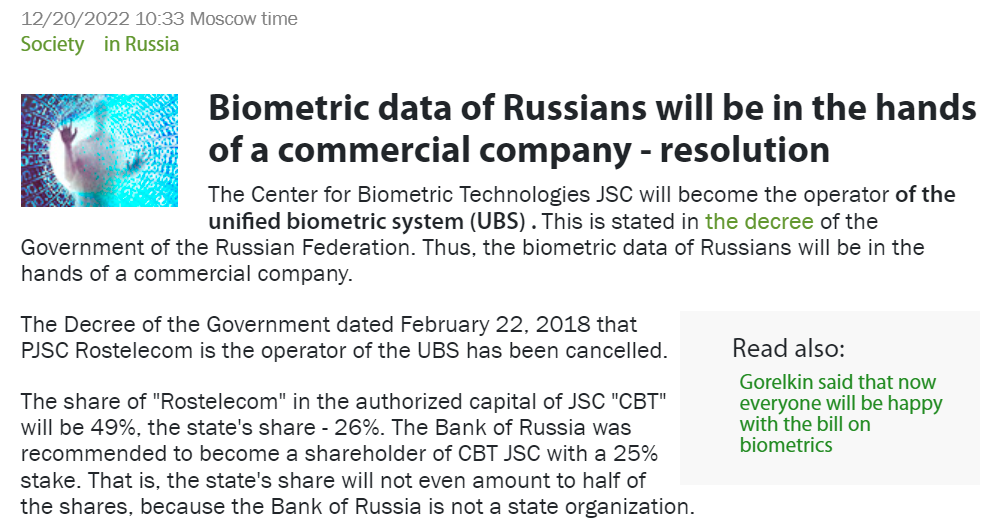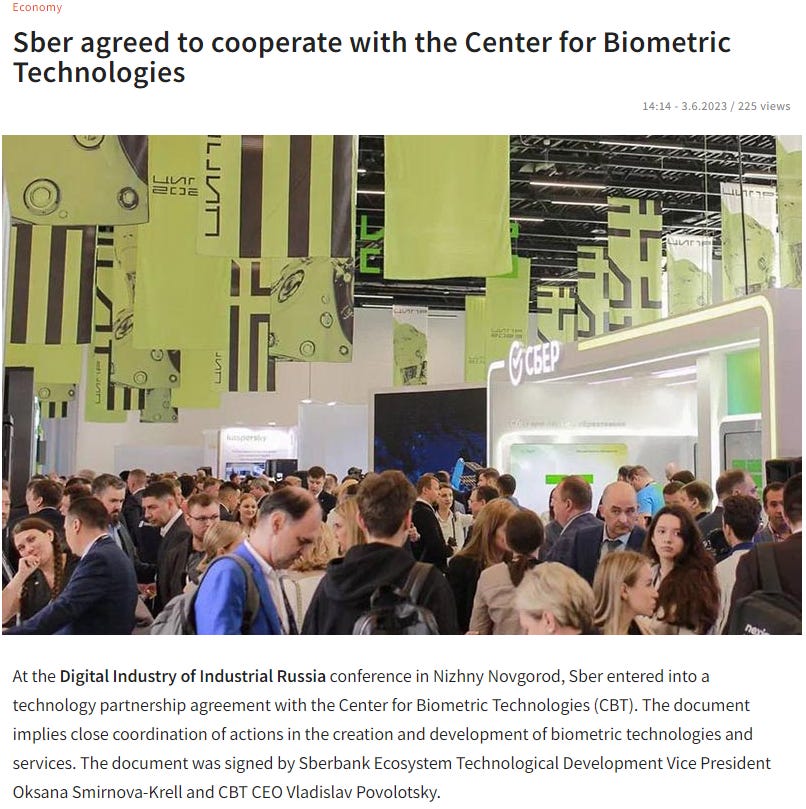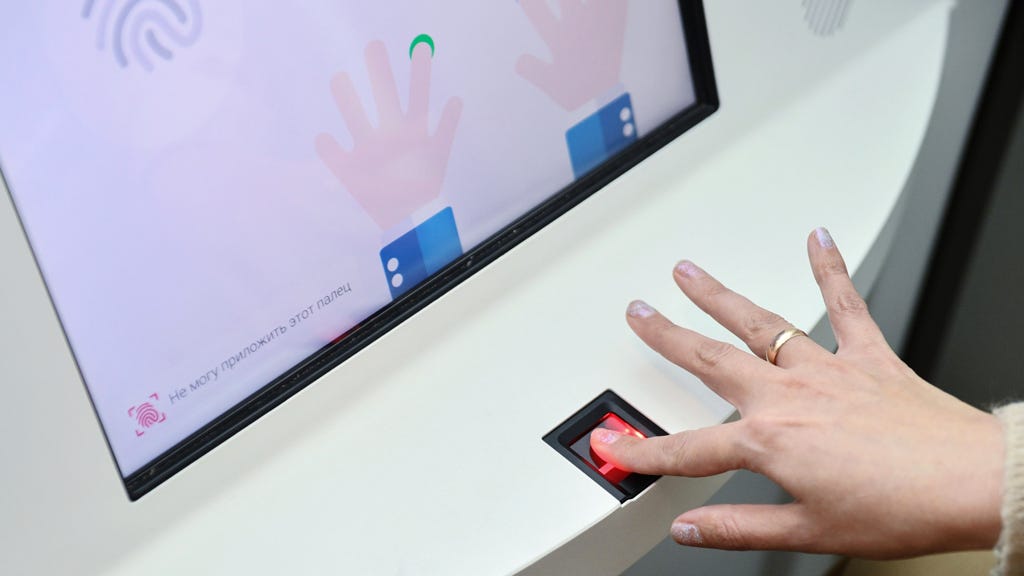State agencies & friendly bank cheer for "transition to biometrics" in Russia
But Russians are not so enthusiastic
Russia’s Unified Biometric System (UBS), a commercially operated national biometrics database (no, I’m not joking—more on that later), has been billed as a safe and effective way to identify the proles.
But there’s a problem: Many Russians don’t know about the miracle of for-profit biometrics, and the ones who do know about it are not very excited for some weird reason. Obviously this is unacceptable, so TASS (a state-owned media outlet) and VTsIOM (a state-owned polling agency) teamed up to host a biometrics cheerleading event.

The summit featured some of the biggest names in “digital development”: Yuri Shabanov, deputy director of the Ministry of Digital Development’s department for creating digital identification technologies, Vladislav Povolotsky, CEO of the Center for Biometric Technologies (the commercial enterprise that operates Russia’s UBS), Oleg Evseev, director of the Biometrics division of Sberbank (which is not just a bank, but a “universe of services”—including clot-shot services), and Dmitry Markov, CEO of biometrics firm VisionLabs (Sber sold its 25% stake in the company in 2021).
However, the biometrics conference started with some discouraging news.
Citing the results of a new survey, VTsIOM announced that only 55% of Russians are familiar with the concept of biometrics, while 39% of respondents expressed total bewilderment about this new digital tagging method.
The state-sponsored survey found that 42% of Russians have been asked to provide biometric data. 29% agreed to the collection and processing of such data, while 13% refused.
As VTsIOM explained (emphasis their own):
The results of the survey show that among Russians a neutral-negative attitude towards providing biometric data prevails: 34% are indifferent to it (among young people aged 18-24 - 46%), 32% reacted negatively to the idea.
An analysis of the answers of those who perceive this practice negatively made it possible to single out the following four groups of arguments against the collection of biometrics:
Invasion of privacy (including “collection of personal data / violation of human rights and freedoms” - 25%, “control / surveillance of a person” - 7%, “the state uses biometrics against people / to create a digital concentration camp” - 4%).
Reluctance and lack of trust (“they store data poorly / leaks are possible” - 11%, “I don’t trust / don’t want / don’t like it” - 11%, “abuses are possible” - 8%, “can be used by scammers” - 6%, “unsafe” - 3%).
Lack of need (“no sense / I don’t see the need / there is no need” - 11%).
Lack of awareness (“incomprehensible / unusual / I don’t understand why this is being done” - 5%).
A positive attitude to the delivery of biometrics was expressed by 27% of Russians. According to its supporters, this procedure has such advantages for users as:
Security (“fighting fraud / helping to catch criminals” - 24%, “improving security” - 8%, “data protection” - 6%).
Transparency (“identification of a person” - 15%, “it is easier to find a person” - 11%, “more information about a person” - 5%, “an honest person has nothing to hide” - 3%).
Simplicity (“it is more convenient / easier to use various services” - 19%, “simplifies the system of identifying people” - 5%, “reduction of bureaucratization” - 2%).
Progress (“this is the future / development of mankind” - 4%).
Order (“increase the level of control over people / discipline” - 4%, “control over people crossing the border” - 2%).
Another 7% simply expressed support without justifying the reasons (in the group declaring a positive attitude).
To sum up: Even the government’s state-run polling agency admits Russians currently have a “neutral-negative attitude” towards the collection and use of biometrics. This must be remedied, according to the country’s biometric crusaders.
A few highlights of what was said during this event, compliments of Nakanune.ru:
The speech of the Director General of the Center for Biometric Technologies (CBT), Vladislav Povolotsky, was characteristic. CBT is the operator of the Unified Biometric System, which, by the way, is a commercial company. An interesting point is that there is very little information in the public domain about Povolotsky himself. […]
“Our task is to form the right habits,” Povolotsky told the attendees, stressing that it was necessary to teach people to use biometrics to receive services. [Once biometrics are accepted], “people won’t have to leave the house,” he claimed. (This already happened recently, and people really didn’t like being locked down.)
Let’s pay attention to an important point. Povolotsky emphasized that his company does not own personal data—passport data, etc. He only has biometrics, so, he says, there is nothing to fear. But the Federal Law of December 29, 2022 N 572-FZ is called “On the implementation of the identification and (or) authentication of individuals using biometric personal data ...” That is, biometrics are personal data. Are people being taken for fools?
The speeches of the director of the Biometrics division of Sberbank, Oleg Evseev, and the CEO of VisionLabs, Dmitry Markov, did not differ significantly. Everyone wants to ensure that people live more comfortably and safely.
True, Markov acknowledged that the biometric market, according to their estimates, will grow by 15-20% per year, which promises big benefits. He was the only one who openly recognized the benefits for businessmen.
Now for some observations from Nakanune’s report, which I encourage you to read with attention and care:
The authorities want to quickly transfer all citizens to biometric identification for total control over people’s lives, many experts believe. Others assure us that this is done solely for the convenience of the citizens themselves. Today, at a press conference hosted by TASS, it became known what the actors who promote the biometric agenda and the introduction of biometric technologies in Russia think about this.
Actually, there was no such discussion, because all the participants represented commercial structures and were interested supporters of the introduction of biometrics.
Even the representative of the state, Deputy Director of the Department for the Development of Digital Identification Technologies of the Ministry of Digital Development, Yuri Shabanov, did not act as a statesman, but showed exclusively commercial logic for promoting biometrics: services, convenience, etc. A very strange position for an official living in a commercial paradigm. […]
What is depressing is that on the issue of biometrics, the state—and even more so commercial companies—are interested in one thing: to benefit from the exploitation of personal data under the pretext of taking care of the people. […]
In general, the entire “expert discussion” … was reduced to an advertisement for biometrics and a call to transition to this technology as soon as possible. But what to expect from businessmen? Are they thinking about the integral interests of society?
Unfortunately, the authorities in Russia have taken a course towards “digital-biometric enslavement” of people, and are not going to weaken their position. Over time, this can lead to unexpected consequences, given our technological dependence on the West.
For those interested in another perspective, Katyusha.org also filed a report on this biometrics fiesta. Despite their ideological differences (Nakanune—socialist, Katyusha—conservative), you’ll find that Katyusha’s conclusions were very similar to what Nakanune relayed to its own readers.
I don’t want to rehash how the UBS came into existence (it was rushed through the State Duma and then signed into law by Putin as Russians were gearing up for the New Year holiday, i.e. the government successfully employed the same shenanigans that ultimately failed to force through the national QR code law—the Russian State is learning!), but I encourage anyone who isn’t familiar with this incredible and worrisome story to read our previous reports on this subject:
Russia’s biometric nightmare (December 22, 2022)
‘Tis the season for biometrics-giving (December 23, 2022)
Ungrateful Russians give friendly centralized biometrics database 1-star Yelp reviews (December 30, 2022)
Putin signs cinnamon-swirl biometrics law (December 30, 2022)
Russia’s Unified Biometric System: Question More? (January 6, 2023)
UN agency: Unified Biometric System will help Russia achieve Sustainable Development Goals (January 8, 2023)
Safe, convenient & for your protection (January 18, 2023)
Excluding the awe-inspiring legislative trickery used to create a national biometric database that nobody asked for or wanted, it’s important to know that the UBS is operated as a commercial enterprise. You have to respect the hustle:

The sole protector of Russia’s biometric data, the Center for Biometric Technologies JSC (joint-stock company), has the following stakeholders: Rostelecom (49%), the Russian government via the Federal Property Management Agency (25%), and the Bank of Russia (25%).
The Bank of Russia—like all friendly central banks—is not a government agency. Rostelecom, which was initially appointed the sole operator of the UBS, is partially state-owned, but the government does not have a majority stake.
In layman’s terms: The Russian government has handed over Russia’s biometric data to a for-profit joint-stock company that it doesn’t fully control.
Technically there are ways to opt out of this system, but like all “voluntary” measures in Russia and all over the world, voluntary consent has a funny way of becoming mandatory. More on that some other time.
As of June 1, 2023, Russian banks, the Central Bank, any companies and individual entrepreneurs, notaries, state and municipal authorities, will be required to transfer any biometric data they have to the UBS. For now, the biometric data will be limited to face scans and voice recordings.
Meanwhile, certain business sectors are getting very excited about the future of biometrics in Russia.
In early June, Sber signed a technology partnership agreement with the Center for Biometric Technologies. The new business partners will work together to develop biometric technologies and services in the country.

(Reports emerged in mid-June that Sber had started to send notifications to clients about the transfer of biometric data to this for-profit database.)
The wonders of biometrics are already being embraced by fitness centers, and probably many other businesses:

Even a not very imaginative person could easily imagine where this is all leading.
Thank you for reading Edward Slavsquat, the only English-language blog reporting on this mess.





“[Once biometrics are accepted], ‘people won’t have to leave the house,’ he claimed.”
For what he means by “house,” see that scene in The Matrix when Neo first wakes up in the real world.
When the state takes power, it's called authoritarianism or a dictatorship.
When corporations help the state gain power and the state helps the corporations, it's called fascism.
But don't tell Tom Luongo or "the Duran". They think it means that Russia has "modernized".